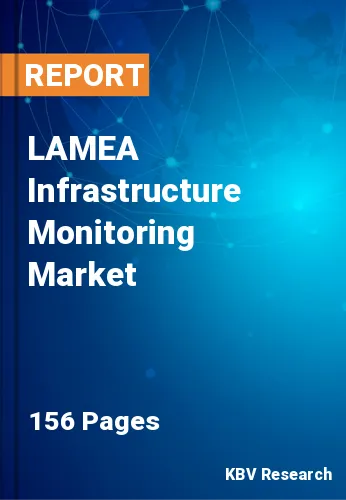The Latin America, Middle East and Africa Infrastructure Monitoring Market would witness market growth of 13.1% CAGR during the forecast period (2023-2030).
In forensic investigations, infrastructure monitoring is crucial to identify the primary cause of errors at the site. Monitoring the infrastructure makes it feasible to constantly identify the main source of faults on the site. Infrastructure monitoring systems offer the chance to evaluate progress toward organizational goals and provide the information or data required to understand the condition or wellness of the facility. The rising IT and telecom sectors may substantially impact the market's potential for growth.
As any firm's downtime or unavailability results in considerable revenue loss, constant insight into the system infrastructure is essential for business continuity. The system's overall security directly impacts the business. By adhering to Service-Level Agreement (SLA) criteria, organizations can prepare to satisfy crucial customer requests and expectations using infrastructure monitoring data.
Infrastructure monitoring systems are developed to monitor and identify performance issues related to industrial infrastructure and its equipment to ensure operational effectiveness & streamlined performance. Infrastructure monitoring solutions provide many advantages, including improved reliability, operational safety, and accurate & early identification of industrial facilities and equipment problems.
According to the International Trade Administration (ITA), the UAE's healthcare system is notable because public spending accounts for more than two-thirds of all healthcare costs. The government budget 2022 allotted $15.8 billion (AED 58.931 billion) for public spending, of which 8.4% will be used for healthcare. In 2018, medical tourism brought in AED 12.1 billion ($3.29 billion) for the UAE. In the UAE, 350,118 foreign patients were seen in 2018. In the future years, the UAE government expects to observe a rise in the number of people seeking medical care there. The growth of IoT and healthcare will lead to an increase in monotonizing, which will support the expansion of this market.
The Brazil market dominated the LAMEA Infrastructure Monitoring Market by Country in 2022, and would continue to be a dominant market till 2030; thereby, achieving a market value of $195.6 million by 2030. The Argentina market is anticipated to grow at a CAGR of 13.7% during (2023 - 2030). Additionally, The UAE market would witness a CAGR of 12.8% during (2023 - 2030).
Based on Vertical, the market is segmented into Construction, Manufacturing & Automotive, Oil & Gas, Aerospace & Defense, and Power Generation & Others. Based on Application, the market is segmented into Vibration Monitoring, Damage Detection, Corrosion Monitoring, Crack Detection, Thermal Monitoring, Multimodal Sensing, Strain Monitoring, and Others. Based on Component, the market is segmented into Hardware, Software, and Services. Based on Technology, the market is segmented into Wireless, and Wired. Based on countries, the market is segmented into Brazil, Argentina, UAE, Saudi Arabia, South Africa, Nigeria, and Rest of LAMEA.
Free Valuable Insights: The Worldwide Infrastructure Monitoring Market is Projected to reach USD 9.6 Billion by 2030, at a CAGR of 10.4%
The market research report covers the analysis of key stake holders of the market. Key companies profiled in the report include Parker Hannifin Corporation, Siemens AG, General Electric Company, Honeywell International, Inc., Rockwell Automation, Inc., Yokogawa Electric Corporation, National Instruments Corporation, Acellent Technologies, Inc., Campbell Scientific, Inc., AVT Reliability Ltd (A.E.S. Engineering Limited).
By Vertical
By Application
By Component
By Technology
By Country
Our team of dedicated experts can provide you with attractive expansion opportunities for your business.

